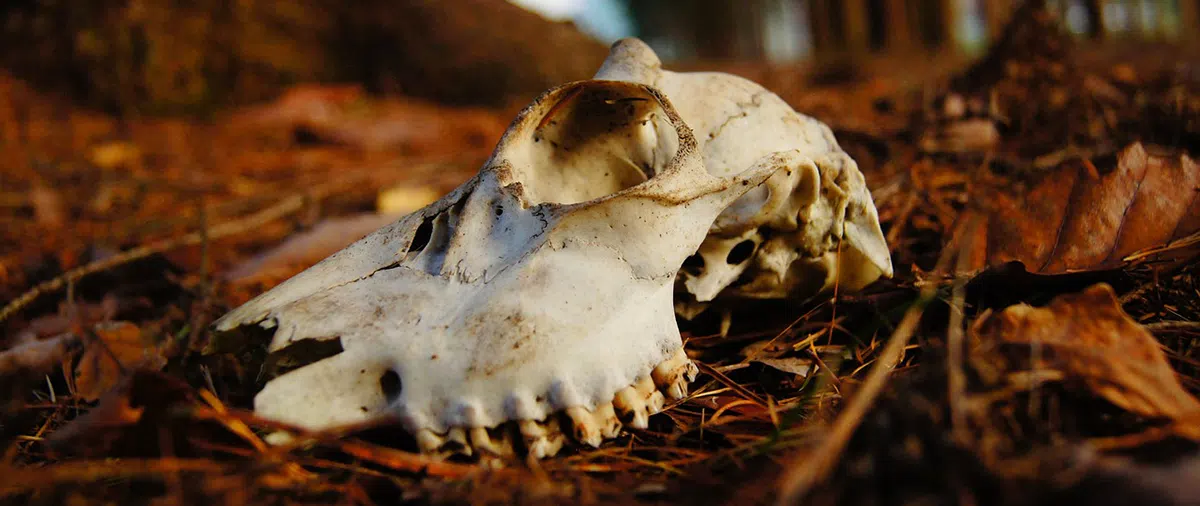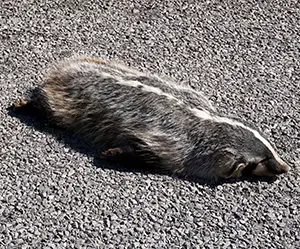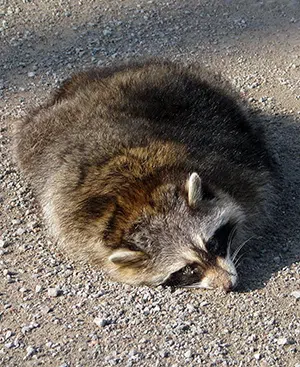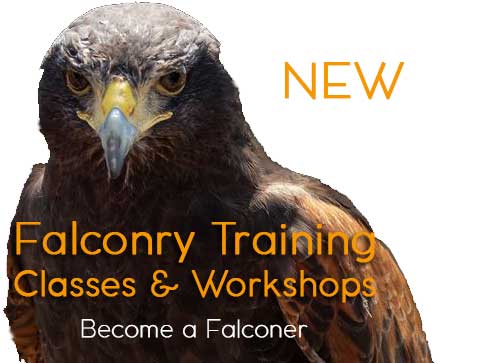First things first - let's confirm that the animal is actually deceased. It could just be stunned and spring to life when handled - this is potentially dangerous. If regaining consciousness, the animal may be disoriented, perceive you as a threat, and go on the offensive.

What To Do If You Find a Dead Animal: Assessing the Situation
After you have confirmed that the animal is dead, try to determine how it may have died. Was it hit by a vehicle, can you observe any physical trauma, or does it look like the animal perished from disease or poisoning? If there is not discernable trauma or injuries present, extra caution is in order when determining what to do if you find a dead wild animal.
Health Risks Associated with Dead Animals
 All things dead potentially carry some health risks. It doesn't really matter what type of animal you've come across. However, particularly animals known to carry rabies ought to be handled with great care. You'll also want to keep decomposition risks at a minimum.
All things dead potentially carry some health risks. It doesn't really matter what type of animal you've come across. However, particularly animals known to carry rabies ought to be handled with great care. You'll also want to keep decomposition risks at a minimum.
Bacterial Infections
Dead animals can carry bacterial infections that may be transmitted to humans or pets, including:
- Salmonellosis
Salmonellosis is a bacterial infection that can be spread by many types of animals, both wild and domestic. Symptoms include diarrhea, stomach pain, fever, and vomiting. - E-Coli
E. coli, or Escherichia coli, is a type of bacteria that is frequently found in the intestines of humans and animals alike. Most E. coli strains are harmless and necessary for digestion, produce vitamins, and protect against harmful germs. However, some strains can cause illness, with symptoms including diarrhea, urinary tract infections, pneumonia, and even sepsis. - Brucellosis
Brucellosis is a bacterial infection that can be present in animals with no noticeable symptoms. Smoking, cooking, freezing, drying, or pickling meat does not kill the bacteria that cause brucellosis. - Tularemia
Tularemia is a bacterial disease that is transmitted through direct contact with an infected animal, its blood, or its tissues. It can also be transmitted by means of a bite by an infected insect, such as a tick or a biting fly.
Viral Diseases
The greatest concerns in terms of viral diseases is rabies. Rabies, once symptomatic, is fatal for humans. Unfortunately, once the animal has succumbed, only a brain biopsy performed by a veterinarian can confirm the presence of rabies, since you cannot observe the animal's behavior. Depending on the season and ambient temperature, the rabies virus can survive in a carcass for months. If the deceased happens to be a bird, there is also a concern about contracting Avian Influenza.
Parasitic Infestations
Parasites may also be a concern. This includes:
- Toxoplasmosis
This disease is caused by the parasitic protozoan Toxoplasma gondii. Most people infected with Toxoplasma don't show any signs of disease, but infants and people with weakened immune systems can develop flu-like symptoms, swollen lymph nodes, blurred vision, and even severe illness. - Roundworm
Roundworm can cause abdominal pain, nausea, vomiting, diarrhea, bloody stools, or seeing a live worm in your stool or vomit as well as respiratory symptoms: Cough, wheezing, or shortness of breath
Other symptoms may include fatigue, weight loss, fever, restlessness, or skin infections and rashes.
Proper Disposal Methods
 If you've decided to take care of business yourself, please arm your self with some PPE and disposal gear. Gloves, mask, coveralls (if possible) plenty of plastic bags, etc.
If you've decided to take care of business yourself, please arm your self with some PPE and disposal gear. Gloves, mask, coveralls (if possible) plenty of plastic bags, etc.
Small Animals
The fastest way to dispose of a small animal is to bury it. This has to be done on your property and at a minimum of 2 feet below ground level. In rural areas and if we are certain that the animal was hit by a car or had some other unfortunate accident, we can also leave the carcass in a ditch for other animals (skunks, opossums, birds of prey, etc,) to feast on. Cue "Circle of Life" song. However, if we are unsure of what exactly killed our furry friend, we definitely will want to keep other animals away from it. It's also a good idea to check with your municipality and see if there are any special instructions. Lastly, you can hire a private company dealing with wildlife removal and call it a day.
Large Animals
Again, burial is probably the most common way to dispose of a large dead animal. Keep in mind soil depth where you're planning on burying the animal. Graves for large animals like horses or cows need to be dug a minimum of 5 feet deep. You'll hopefully own a backhoe to do the job or can call on a neighbour. Incineration is another fairly common thing out in the country - not an option in an urban environment. If you are in the city, calling your local animal control may be your only viable option.
Cleaning and Disinfecting the Area
No matter what did in our furry friend, we ought to clean the area where he found his demise as best as we can. This will help with preventing the spread of any potential diseases and keep scavengers at bay. Rake the immediate area where you found the animal, scoop what you've raked up into the burial site. MAKE SURE YOU WEAR A SUFFICIENT MASK and gloves. You don't want to inhale airborne pathogens. After the animal has been removed, spray everything down with a bleach and water solution and allow it to dry.
Legal Considerations
Again, it's a good idea to speak to someone at your municipal office and confirm what you may do and how. There's also the official website for Ontario - check here as well.
When to Call Animal Control
If you are unsure of how the animal died, if the animal looks sickly (signs of weight loss, for example), it may be safer to call your municipal animal control. They will know how and where to dispose of the dead animal. Each city likely has its own rules and restrictions; here is what the City of Toronto has published: https://www.toronto.ca/community-people/animals-pets/enforcement-assistance/
Hawkeye's Dead Animal Control Services
If you'd rather not get the municipality involved, there's always the option of a wildlife removal company offering animal control services such as Hawkeye Bird & Animal Control. While we do not deal with large animals or livestock, we'll happily take small animals like birds, squirrels, skunks, opossums, or raccoons off of your hands. Contact us today for wildlife carcass removal and biohazard cleanup.














